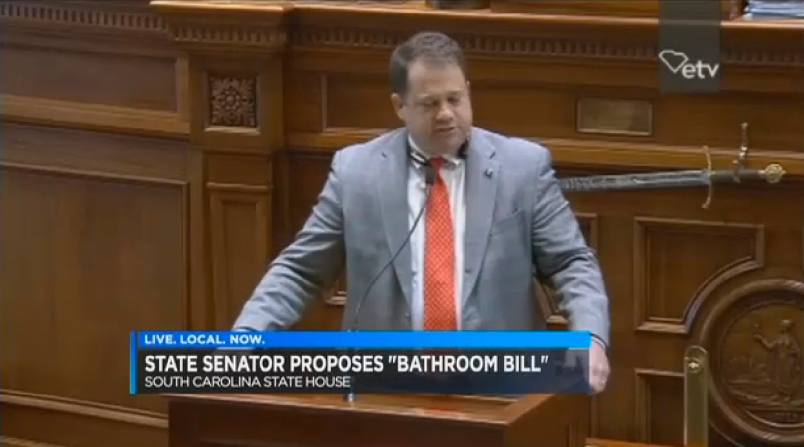COLUMBIA, S.C. (AP) — A South Carolina senator wants to bar local governments from requiring businesses to let transgender people use the bathroom of their choice, saying he’s taking a “stand for decency and common sense.”
The bill introduced Wednesday by Sen. Lee Bright would also require multi-stall bathrooms on public property to be designated and used “based on biological sex.” It specifically includes student bathrooms, locker rooms and shower rooms in public schools.
How private businesses handle their bathrooms should be up to the owners, not government, he said.
He knows of no city in South Carolina where that’s an issue, but he supports a North Carolina law that prohibits local communities from enacting anti-discrimination ordinances and requires transgender people to use public bathrooms that match their sex at birth. That law has drawn national backlash and prompted PayPal to announce Tuesday that it will cancel a major expansion in the state.
“We keep talking about tolerance, tolerance, tolerance,” said Bright, R-Roebuck. “I stand with our neighbors to the north and stand for decency and common sense. It’s a public safety issue. We don’t need men going into a women’s bathroom.”
Sen. Joel Lourie, D-Columbia, said the proposal is ridiculous, unnecessary and can hurt the state financially.
“I can see no logistical reason why we would entertain such a measure,” he said.
GOP Gov. Nikki Haley agreed that there’s no need.
“In South Carolina, we are blessed because we don’t have to mandate respect or kindness or responsibility in this state,” she said. “I don’t know of any example that we’ve had a problem.”
Asked if Gov. Pat McCrory was right to sign the measure, Haley said, “I think the governor of North Carolina had to do what he thought was right.”
Judiciary Chairman Larry Martin supports the bill, saying he doesn’t want “cross-dressers” going into a bathroomwith his granddaughters. Businesses can best accommodate people by having single-occupancy, unisex bathrooms, he said.
He said it’s not about discrimination.
“I don’t care what your sexual persuasion is. I don’t want children exposed to folks who don’t know their identity,” said Martin, R-Pickens.
But he said time constraints make it unlikely for the measure to pass this year. A May 1 deadline for bills to move from one chamber to the other looms.
The South Carolina bill was sent to the committee chaired by Sen. Kevin Bryant, who also signed on as a co-sponsor. He was optimistic about the bill’s chances.
“I’m going to focus on the free-market approach,” said Bryant, R-Anderson. “It’s not the government’s role to tell businesses how to configure their bathrooms.”
House Speaker Jay Lucas’ office declined to weigh in on the bill’s chances in that chamber.
___
Associated Press writer Meg Kinnard contributed to this report.
Copyright 2016 The Associated Press. All rights reserved. This material may not be published, broadcast, rewritten or redistributed.







He went on to emphasize, “Because they might get cooties!”
Meanwhile, his granddaughters collectively rolled their eyes.
"An’ jist like ar’ Chrischen’ brothers in NothCareOlina’ …we good ol’ boys hea’ in Sow-thCareOlina are gonna’ git the HooHoo Police on this as soon as it’s enacted. Thank yew! "
Would someone prominent in a major news organization please book one of the Reps pushing these transgender bathroom bills. please? During the interview ask for a single citation of a transgender person assaulting, harassing, molesting or raping someone else in the restroom. Just one verifiable citation. Goddamn, journalism isn’t that freaking difficult.
‘It’s A Public Safety Issue’’
No. Not in any way that isn’t covered by existing law.
We’re told every day how there is no GOP establishment any more…so, what agency is coordinating all these absurd yet nearly identical state legislative efforts across the South?